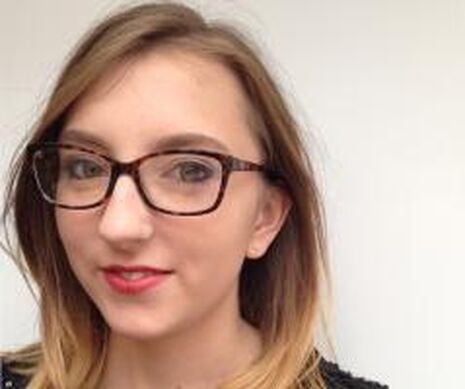Millie Brierley: Week 4
On fear and loathing

Today is Halloween: the day we (questionably, in my view) call a holiday, before consuming obscene quantities of ill-gotten sweets, dressing up as ‘sexy’ characters from Frozen and intimidating the elderly into staying home with the curtains drawn and lights off. (Is my scepticism obvious yet?)
Tonight, children will take old bed sheets out of airing cupboards and transform themselves into (admittedly adorable) ghosts. Teens will pile into each other’s front rooms and vehemently assure each other that The Shining is absolutely not at all scary, even though their voices will have jumped an octave (“it’s funny, really!”). Adults will gouge the flesh out of pumpkins to create all manner of monstrous faces, all the while trying to convince themselves – and others – that they have not, in fact, inadvertently carved an uncanny resemblance of the weird neighbour two doors down. All this in the name of fear.
But what if the smoke and mirrors in the haunted house are just that – smoke and mirrors? What if we have been scared of the wrong things all along? What if the gargoyle on the lawn over the road is actually just a distraction, allowing the real evil to sneak in and take hold, while our hearts are still racing after the shock of the latest person to jump out on us, wearing a mask?
We humans have a nasty habit of this: we know something is afoot, but we look the other way and miss it. An athlete puts four bullets through his girlfriend, and we are too busy worrying about his Olympic career to be scared by the prospect of his potentially walking free after just ten months in prison.
We furrow our brows when the news runs a piece on so-called Islamic State, but fail to realise that their murderous rampage extends far beyond the mere suggestion we see on our screens from time to time. The daily reality of those quaking in the shadow of the all-consuming terror whipped up by IS is, inevitably, far, far worse.
We greet the news of a convicted rapist and former footballer leaving prison, potentially to return to his career as a sportsman and role model, not with disgust, or heartbreak for his victim (the new identity of whom, thanks to the internet, we now know), but with concern that he is not being given the opportunities for rehabilitation that he, apparently, so richly deserves.
And what about the Ebola panic which is gripping the West at the moment? Is that not just yet another chimera, this time dressed in a Hazmat suit? It is no coincidence that the disease is ravaging West Africa, while the rest of the world remains largely unscathed. It is no coincidence that the countries worst affected are among the world’s poorest. These are nations dealing with systematic poverty: the vast majority of those who have so far died as a result of the Ebola virus lived without access to adequate housing, clean water and hygienic sanitation.
We, in Britain, have no right to look at the pictures coming from Liberia, Sierra Leone and Guinea – of patients occupying whatever space they can find in hospitals and make-shift treatment centres – and worry that they could be us. Because it is simply not true. Ebola is not accidentally attacking West Africa.
If patient zero had somehow lived in Britain, we would not now be seeing the same scenes of devastation, simply transplanted onto home turf. When disease strikes, it hits those least equipped to deal with it hardest. Countries like Liberia do not have the infrastructure, frameworks or healthcare systems to cope with, and contain, such an outbreak. But we do.
And that is the difference. The hysteria that is currently gripping Britain and the US is, quite frankly, embarrassing: a shameful symptom of rich western privilege, yes – but not of Ebola. For us to fret over the possibility of an Ebola epidemic sweeping our own nation is to wilfully ignore the reason the disease has caused such desolation in Africa: poverty. I am quite certain that, as chief medical officer Dame Sally Davies has said, Ebola will reach British shores, but we, unlike Liberia, Sierra Leone and Guinea, have the resources, expertise and healthcare provision to contain it. Failure to recognise this is insulting to those who are not so lucky.
While we are busy fearing for our own skins, abject poverty and the Ebola virus are joining deadly forces in West Africa to wreak utter havoc, and, once again, we are fearing the wrong monster.
Britain needs to wake up and realise that the gargoyle on the lawn over the road is really just the neighbour’s dog. The real danger lies elsewhere.
 Comment / Plastic pubs: the problem with Cambridge alehouses 5 January 2026
Comment / Plastic pubs: the problem with Cambridge alehouses 5 January 2026 News / Cambridge businesses concerned infrastructure delays will hurt growth5 January 2026
News / Cambridge businesses concerned infrastructure delays will hurt growth5 January 2026 News / New movement ‘Cambridge is Chopped’ launched to fight against hate crime7 January 2026
News / New movement ‘Cambridge is Chopped’ launched to fight against hate crime7 January 2026 News / AstraZeneca sues for £32 million over faulty construction at Cambridge Campus31 December 2025
News / AstraZeneca sues for £32 million over faulty construction at Cambridge Campus31 December 2025 News / Uni-linked firms rank among Cambridgeshire’s largest7 January 2026
News / Uni-linked firms rank among Cambridgeshire’s largest7 January 2026








